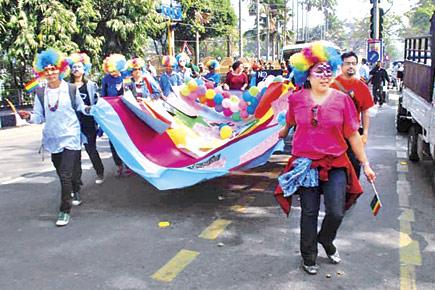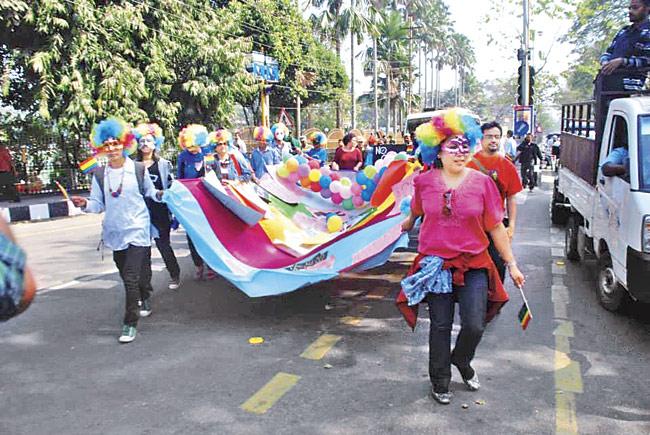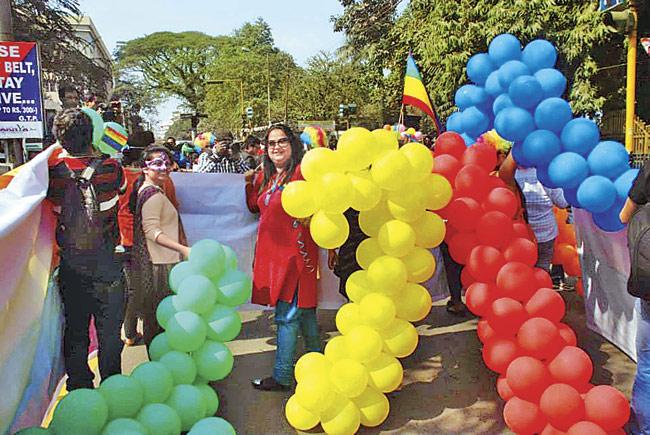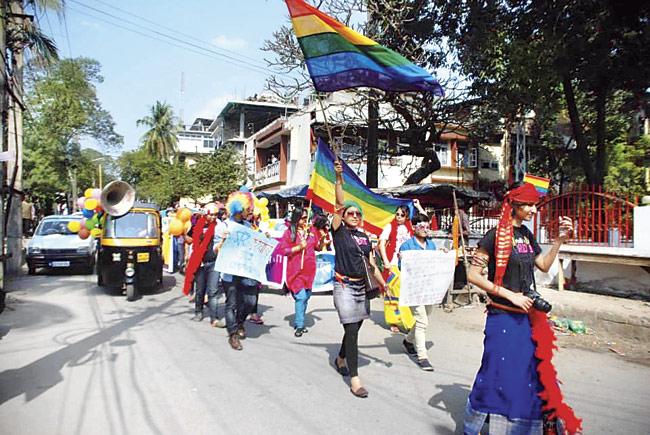At a time when the North-East seems to be in focus because of a spate of assaults targeting people from the region, the recent Guwahati Pride opens a bold, new frontier on gender rights for that corner of the country

Gay activist and one of the most prominent faces and voices of the Lesbian Gay Bisexual Transgender Queer (LGBTQ) community, Delhi’s Lesley Esteves was seen at Mumbai’s Gay Pride held on Saturday. February 1. Amongst all those rainbow flags which are symbolic of diversity,the community espouses, Lesley’s placard stood out. ‘Contribute towards Guwahati Gay Pride’ it said or words to that effect.
ADVERTISEMENT

Assam has never seen anything like it
Lesley was collecting funds for a path-breaking Gay Pride March to be held in Assam’s capital, Guwahati on February 9. Lesley says, “There were contributions by individuals at Mumbai Pride and Delhi Queer Pride Committee, through which the modest costs of Guwahati Pride were entirely covered. I travelled to Guwahati to attend the Pride.

Head-turning as this gear proves
The march was smaller than in our big metros. But what was notable was that the scale of the challenge of organising it remained the same, because Guwahati has fewer marchers than the metros but also fewer organisers. There were just a handful of people who worked tirelessly over the past two weeks to make the first queer Pride in the North-East region a success.”

And dance like balloons without a string. It is all about freedom
Fear
Currently, there is anger and fear at attacks faced by people of the North-East, a spate of hate crimes having put the focus on this corner of India. Large-scale protests at the killing of Nido Taniam in Delhi have found resonance everywhere. The Taniam case has resulted in shrill voices being raised at racist stereotypes that continue to box in these people who are labelled offensively as Chinkis, Chinks or Momos.

Passing through the streets of Guwahati
Says Lesley, “In fact at the end of the Guwahati Pride parade, we met another protest put together by the Bulls of Assam Motorcycling Club in Guwahati, to protest the murder of Nido Taniam in Delhi and to demand effective anti-racism laws.
Racism is a burning issue in the North-East and it is an issue that has resonance with concerns of the queer community, because both racism and homophobia are expressions of intolerance of difference. Both are tools of discrimination designed to privilege a small minority of people at the expense of the majority who are marginalised. Queer people in both North-East and elsewhere share a dream of an India which is free from both racism and homophobia.”
Rage
Minakshi Bujarbaruah, activist with the community in the North-East, said, “It was after the Global Day of Rage in December 2013 (to protest the Supreme Court’s decision for the reinstatement of the criminalisation of homosexuality) that I and friends started discussing the issue with other group of concerned individuals who felt for the cause.
In January 2014, a group of individuals came together and started thinking of having the first ever Pride Parade in Guwahati city. Since then we contacted various other people and the LGBTQ community in order to mobilise them for the Pride.”
History
For Bitopi Dutta, organiser- activist, and so many like her, it was a time for gooseflesh, a time for emotion, a time for drama. Their tryst with history had come and on Sunday, February 9, the gay community charted a new course as the first Queer Pride in Assam took off in a blaze of rainbow colours.
Bitopi says, “Guwahati witnessed a historic day. The event started at Dighalipukhuri Park entrance with a peaceful protest against Section 377 of the Indian Penal Code (IPC), followed by the Parade which made its way via Latasil, old SP office, Guwahati High Court, Lamb Road and ended at fountain TC point, Ambari.
The Pride Parade purposely choose to pass the High Court as we wanted them to know that people from the North-Eastern region of India are also in solidarity for ‘decriminalisation of Section 377’.” As the marchers passed the High Court, they raised the rainbow flag high in hope and defiance in front of the court, en route the 1.5 km long stretch which they took 60 minutes to cover.”
Support
Endorsing Lesley’s doff of the hat to both Mumbai and Delhi, organiser Mili Dutta says, “Guwahati Pride received a lot of support from the queer community across the country. The minimal cost of the Pride was completely supported in form of contributions by individual queer people in Mumbai and by the Delhi Pride committee.
There was immense solidarity shown during the Pride as people from far-off geographical locations contributed poetry, slogans, t-shirts and belts for the Pride. Participants danced to Assamese, Hindi and English songs.” If the marchers were wary of homophobia or ready to steel themselves against vicious, verbal attacks, they were pleasantly surprised.
“While the police ensured our safety, participants distributed hearts and rainbow flag stickers to passersby. Their curiosity and appreciation for the Pride was remarkable. There was so much resistance earlier so it is important to note that the Pride made history.”
Sustain
Buoyed by the success of its debut, organisers are now faced with the task of building on it and taking the cause forward. Says Pinki Hazarika, “In order to sustain any movement it is very important for its supporters to keep on meeting and discussing various ways through which society can be educated over LGBTQ issues.
We are now planning to have the first Queer Film Festival,” she ends. It is evident that the community is hoping to use this trailblazer as a springboard to more events on the queer calendar. Like they say, they’re here, they’re queer, get used to it, North-East.
 Subscribe today by clicking the link and stay updated with the latest news!" Click here!
Subscribe today by clicking the link and stay updated with the latest news!" Click here!






